Should we judge people in terms of who they were or what they did? Were their intentions important, or were they the effects they caused?
Casimir the Great (Polish King) had a lover, he committed several acts which today would be considered crimes, but due to his achievements, he bears the nickname "the Great". What counts is not who he killed, raped and betrayed, but how many wars he won, built the castles and established the laws. Another example is Richard Gatling and the project of his craftsman, means protoplasts of present machine guns. He believed that thanks to the high speed of fire, wars would require fewer people, so the losses would also fall. The effect was, of course, the opposite.
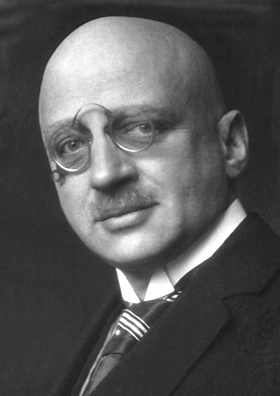
Fritz Haber combines all these questions in one form. However, in order to respond, one needs to know his life, and in order to do so one needs to understand the times in which he had to act.
Belle Epoque
The nineteenth and early twentieth centuries have been a wonderful period in the history of mankind. The development of industry and medicine, combined with the reduction of wars (especially in Europe) led to a huge increase in the world population. [1] This, however, posed a problem of feeding a population whose number was growing geometrically. New agricultural techniques and the introduction of machinery, including food preservation methods (pasteurisation), have temporarily distracted the spectre of hunger, but the problem has remained [2] [3]
Guano - Bitcoin of XIX century ?
Europe's lands were barren and tired. German scientist Aleksander von Humboldt brought a remedium to this problem. He sent collected bird droppings samples from South America to a laboratory to investigate how they affected soil fertility. The results were very good and it turned out that guano perfectly fertilizes the soil, which produces rich yields. In the near future, more clever farmers began to bring them to their plantations, leading to fever in 1845. Peru had 80% of this raw material in its deposits on islands inhabited by guano-producing birds. The country quickly became very rich and revolutionized its infrastructure, railway and army [4].
One of the islands on which guano was extracted
The guano issue was discussed by all the major countries in the world, each of which wanted to grab the wealth for itself in the form of faecal matter. The USA has even enacted a special law to include in its territory islands where manure has been found. [7]
The War of Saltpeter
Guanese deposits have been declining at an alarming rate, leading to price increases. Humanity, however, was lucky again. The change was brought about by the discovery that Nitrogen is primarily responsible for plant growth. It turned out that rich deposits of Saltpeter were located in the desert between Chile and Bolivia. Peru has plunged into crisis, and the guano market has collapsed in favour of its neighbours.
However, they were not in business along the way. The area of the desert was in Bolivian hands, but Chilean companies benefited from fixed fees, established for a period of 25 years. Bolivia, a few years after the agreement, violated the agreement, which ended in a five-year war in 1879, in which Peru was also involved. The result was the seizure of the desert by Chile, Bolivia's exclusion from the sea and the occupation of Peru.[8] For more than 20 years, Saltpeter has become the most important raw material in agriculture at that time. But just as every flame must finally extinguish, so too the salt reserves have begun to dwindle, especially as the population continues to grow. It was even predicted that around 1930 mankind would face a great famine. [9]
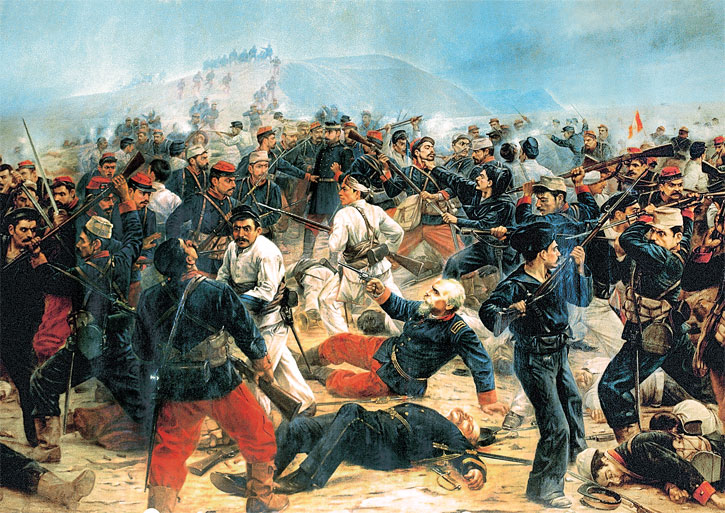
Battle of Arica
And then Germany saves the world!
Fritz Haber has indeed entered and revolutionised the world. But before we move on to how he did it, we need to know the history of this man, from an early age.
Jude
Haber was born into the family of a Jewish textile and dye trader in Breslau. His mother died three months after his birth, and his father never forgave him. This lack of fatherly love has led to attempts to gain his approval through success at school. Haber learned very well, but the real love was chemistry, which he studied through experiments at his aunt's home. Chemistry was flourishing at that time, and young Fritz saw outstanding scientists as heroes. He wanted to go to college, but father insisted that he inherited a shop from him. His uncle saved him from this fate by paying for his studies at two universities.
Fritz also fell in love with the army. He served a year in artillery, where his potential was discovered and he was directed to an officer course. Despite his opinion, he was not promoted because he was a Jew. It was a huge blow for the young patriot genius.
It was no better in his scientific career either. After his doctorate, he could not find a suitable job in the laboratory or in industry. He gained some experience and understood the need for further training in industrial processes, which resulted in his further career. In the end, he returned to his father's shop, but it wasn't good there either. Luck seemed to have smiled at him and received a job at the University of Jena, but he was simply pushed there. After all, he did not stand up and had to be hospitalized in a sanatorium.
Protestant
While working in Jena, he gave up his faith and was baptized. Father's hatred increased even further. Haber, however, did not care about it completely, as he knew that it would allow him to develop his research skills scientifically. In 1894 he moved to the Technical University of Karlsruhe where, a few years later, he became a professor and met with an attempt to solve a nitrate problem.
The idea was simple, Nitrogen accounts for 78 percent of the air composition, it just needs to be pulled out and converted into an applicable form in the soil. In addition, the method used must be cheap and easy to apply in industry, in other words, wonderful.
They put on ammonia, Haber was not the first, the reaction seemed simple, three hydrogen atoms + nitrogen atom = ammonia molecule. Unfortunately, only on paper. Ammonia could have been obtained at a high temperature of 1000 degrees Celsius, but as it cooled down, its concentration decreased, which led to a negligible yield of the product. The reason was the nature of the phenomenon. This reaction is exothermic, i.e. it occurs with the release of heat, which, according to the Le Chatelier's principle, will shift the balance towards substrates, at high temperature. The scientist, feeling a commitment towards himself, the world and the company financing him, BASF devoted himself entirely to research, which even led to the disorder of his health. Finally he came up with an idea, tried to carry out the process under increased pressure. It could have been successful, because from the four moles, two are formed, so that the pressure in the reactor drops. And indeed, the experiment was successful, but only on a laboratory scale. He managed to get about 120 millilitres of ammonia per hour using hydrogen and nitrogen from the air. Unfortunately, the problem here was scalability. What could easily have been done in a small reactor - a large reactor - ended in a disaster. [10]
Apparatus used for the first synthesis of ammonia from atmospheric nitrogen by Fritz Haber
Genius
BASF wanted the results so he was assigned an engineer, Carl Boss, to work. The first step was taken and now the process had to be "only" improved. Scientists have opted for substances called catalysts. Their task was to speed up the process and enable it to be carried out in gentle conditions. The first catalyst was Osm, but it was too expensive to be used industrially. Two researchers had to bet on something else. In the course of the study, several metals were selected, including Uranium, and finally an iron alloy was chosen.
The equipment was designed. The process consisted in mixing methane with water vapour in the presence of a nickel catalyst in order to produce hydrogen, then a part of the hydrogen obtained was combined in a reactor with air. Oxygen with Hydrogen formed water, leaving Nitrogen. It was transported to the third reactor, where the synthesis reaction with the rest of hydrogen took place. It took place under the pressure of 200 atmospheres and 450 degrees Celsius. The product was then liquefied. In this way, an efficiency of 15% was achieved.
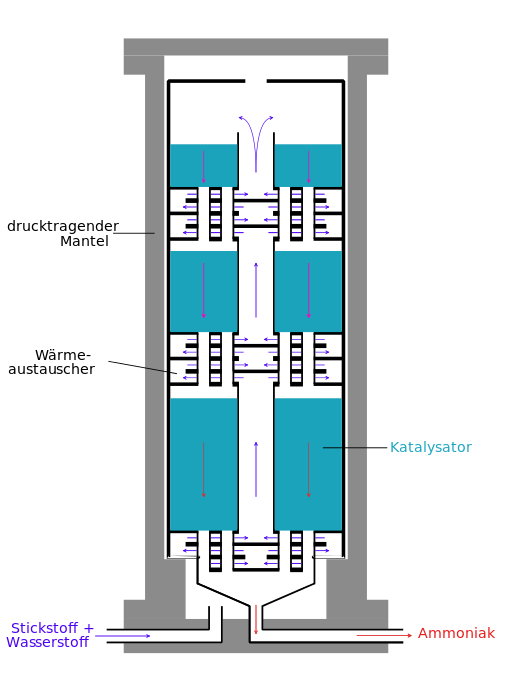
Schematic of the reactor [11]
It may seem that this is not much, but the unreacted gases have been returned to the reactor. The result was a compromise between performance, responsiveness and durability. BASF was in the air. The process proved to have all the necessary characteristics so that synthetic fertilizers could declassify the nitrate. The world was saved and farmers breathed a sigh of relief. In 1913, newspapers wrote about Fritz Haber and his collaborator that they had created bread from the air. And this time journalists did not lie. The Haber-Bosh process still takes about a percent of the world's energy production to this day and the ammonia from the process feeds half of the world's current population. Without it, we would have been condemned to an expensive Frank-Caro trial, Chilean nitrate, or death from hunger. It was recognised in 1918 with the award of the Nobel Prize for Chemistry
The above discovery and its meaning, and the way it came to it, make him my private Superhero. It was not easy for him. As a Jew, he was despised by society to such an extent that he had to change his religion. He set the goal he wanted at all costs, even for his own health, but achieved it by saving the world..
And they lived happily ever aft... No, not yet!
Haber quickly became rich, lived in the estate with his servants, regretted nothing, willingly shared it with his co-workers. He was appointed Director of the Institute of Physical Chemistry at the most respected university in the country. The good streak did not last long as in 1914....
The Archduke was murdered!
- The Archduke murdered: "Thundering newspaper headlines. The greatest nightmare of humanity began, also called the Great War. As a patriot, Haber made it his duty to help the state win. He did not treat it as a tragedy, he was happy about it. He even signed the Manifesto of the Ninety-three, giving his unquestionable support to the Empire.
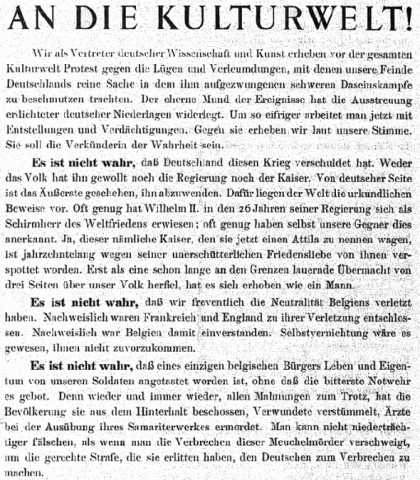
Manifesto
Initially, the scientist supported the country by supplying ammonia, which was essential for the production of nitric acid, a component of explosives. Thanks to him, the Germans had something to shoot after the embargo was imposed by Entente. However, his help did not end there. Acting contrary to the Hague Convention [12] started working on combat gases.
He personally supervised and even tested new types of gas on himself! He watched the first ever attack with this weapon during the Second Battle of Ypres. Both his and his command were very pleased with the results. It was worse to see soldiers who saw the drama of the gassed French trying to get into the damaged lungs with their last breath of life..
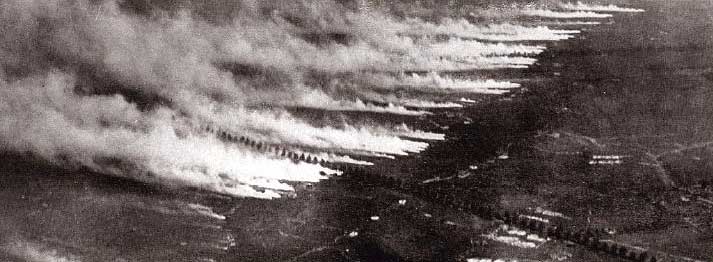
Chlorine attack
As a reward, he was promoted to the rank of captain, whom he was once denied. He also discovered the principle that a short period of exposure to high concentrations is similar in effect to a long period of exposure to low concentrations.[13] Unfortunately, while he was successful in the scientific and military fields, his private life was in ruins.
Wife
Fritz Haber was not a single, he married Clara Immerwahr, whom he met in Wrocław during his military service in 1889. It was not an ordinary domestic hen. This woman was the first German woman to defend her doctorate in chemistry. She wanted to marry Fritz on the model of the Curie couple.
She worked with him, but she could not find her place in the atmosphere of a male-dominated university, and in addition, during conflicts with other scientists, Haber (still facing great fame) was increasingly on their side. It was so stressful that she was even taken to a hospital for the insane. This event was completely unleashed by the scientist.
There was a huge dissonance between the two. Haber blindly devoted to the state and science, Clara fighting for women's rights and professing Pacificism, was not on her way to thinking that her husband was putting his hand on the massacre of other people. On the second of May 1915, after quarrelling with her husband, she took his pistol and shot himself in the garden. She was found by her twelve-year-old son, Hermann..
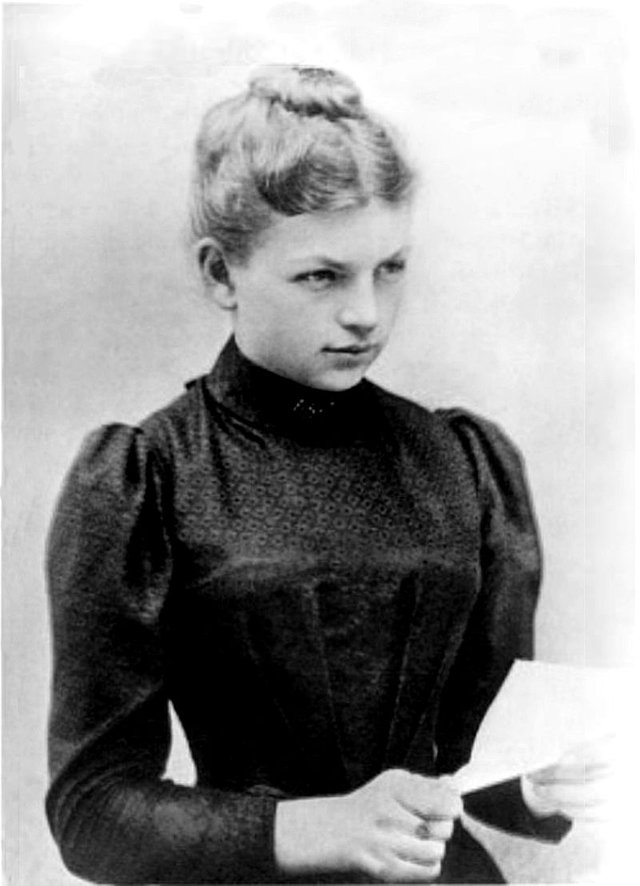
This event did not affect Haber, immediately after the quick funeral he went to the eastern front to explore new types of gas on living targets .
Faithful to the bitter end
The failure did not break the patriotic spirit of the scientist, and he loved his country with all his heart and helped on his behalf to supply Russia and Spain. He also made efforts to obtain gold from sea water. It has failed in this area, but its research has contributed to the development of hydrometallurgy.
Pafter the Nazis came to power, Haber was persecuted as a Jew. He left the country and went to the United Kingdom, did not stay there long and, due to health problems, decided to travel to Palestine. He never arrived there. He died of exile in Switzerland, despised by a nation he had served all his life in.
The tomb of Fritz and Clara Haber - Switzerland. [14]
End?
For Fritz Haber, yes, for his inventions, unfortunately not. Cyclone B, when used as a pesticide, has proven to be a very cheap and effective human killer by accident. It was used in German death camps all over Europe. The fate of millions of people who were gassed by the Nazis was also shared by relatives of the scientist.
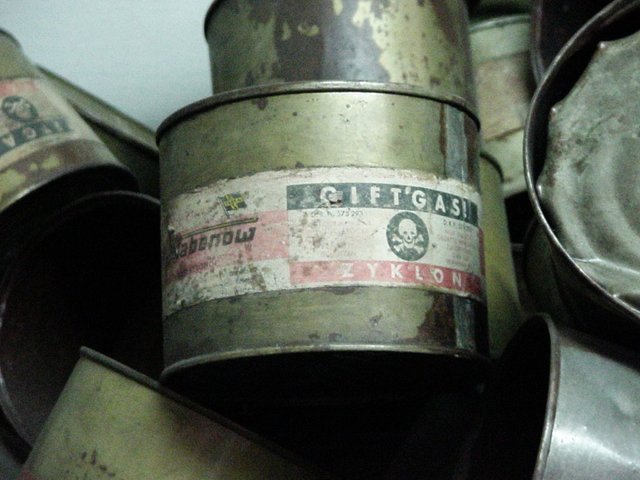
Can of Cyclone B [15]
Judgement
How, then, can this figure be judged in the light of his actions during his lifetime, and what are the consequences of his inventions? My assessment is still positive. For me as a chemist, Haber is the hero. It has put a stop to the spectre of hunger and will allow a green revolution to take place, which has resulted in huge population growth over the last century. His participation in the war was dictated by patriotic motives, and the current assessment is due to the fact that he stood on the side of the loser. As for Cyclone B, it is not it that has blood in its hands, but the people who have used the means to serve humanity against it. In my opinion, Haber, despite his genius, will remain stupid, stupid in love with a country that has never really respected him, and whose favour he has attempted to show him gain as in his youth he fought with marks for his father's attention.
End
Sources:
[1] http://geografia.na6.pl/rozwoj-liczby-ludnosci-swiata
[2] https://www.medme.pl/artykuly/historyczne-oblicza-medycyny-wiek-xix,35377.html
[3] https://pl.wikipedia.org/wiki/Rewolucja_przemys%C5%82owa
[4] https://en.wikipedia.org/wiki/Guano_Era
[5] https://pl.wikipedia.org/wiki/Ernest_Malinowski
[6] https://creativecommons.org/licenses/by-sa/3.0/
[7] https://en.wikipedia.org/wiki/Guano_Islands_Act
[8] https://pl.wikipedia.org/wiki/Wojna_o_Pacyfik
[9] https://pl.wikipedia.org/wiki/Fritz_Haber
[10] https://en.wikipedia.org/wiki/Haber_process
[11] https://en.wikipedia.org/wiki/Haber_process#/media/File:Ammoniakreaktor_MS
[12] https://pl.wikisource.org/wiki/Konwencja_haska_IV_
[13] https://en.wikipedia.org/wiki/Haber%27s_rule
[14] https://en.wikipedia.org/wiki/Fritz_Haber#/media/File:Clara_Immerwahr
[15] https://pl.wikipedia.org/wiki/Cyklon_B#/media/File:Zyklon_B_Container
You forgot to translate word "wieku" for "century" here -> Guano - Bitcoin XIX wieku? :)
Downvoting a post can decrease pending rewards and make it less visible. Common reasons:
Submit
yeah, thanks
Downvoting a post can decrease pending rewards and make it less visible. Common reasons:
Submit
Very interesting the article, the once most wide view of history that has been forgotten by many, before so thanks to these innovations at the time today the progress of Nations. Best regards!
Downvoting a post can decrease pending rewards and make it less visible. Common reasons:
Submit
Nice writeup, I got to know more about this scientist. Thanks for sharing
Downvoting a post can decrease pending rewards and make it less visible. Common reasons:
Submit